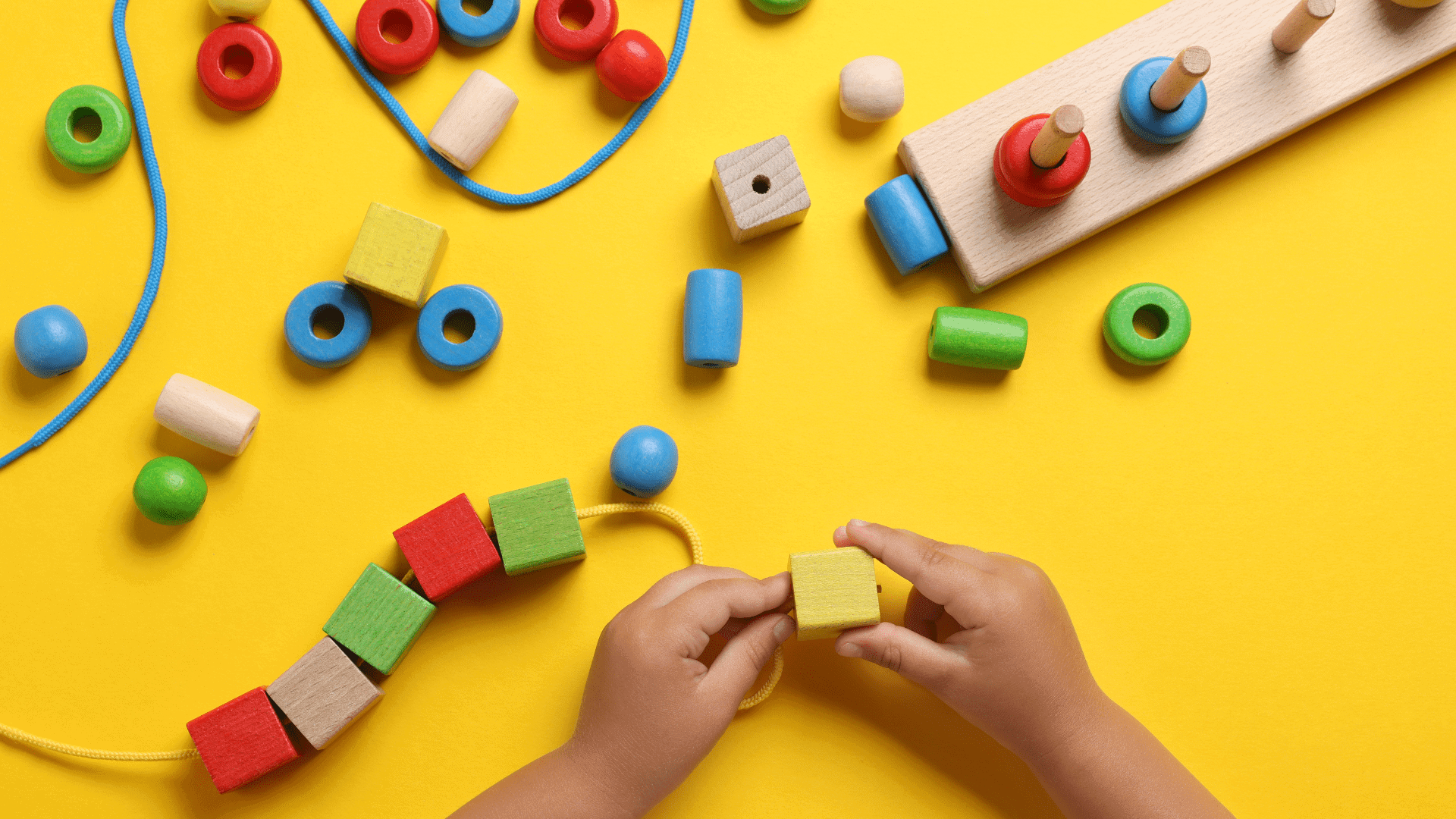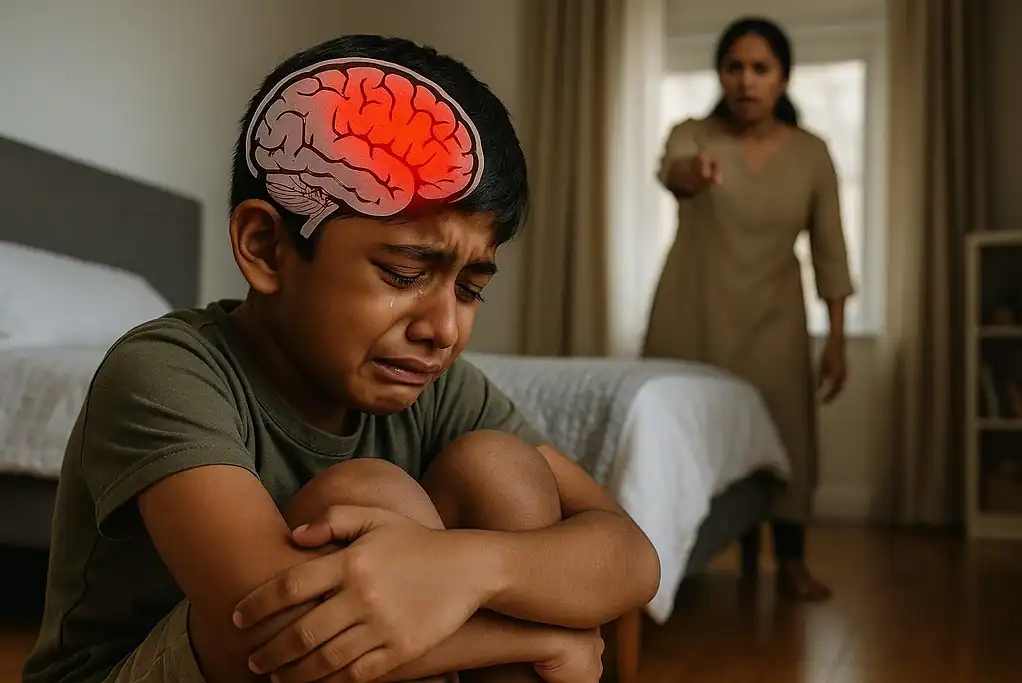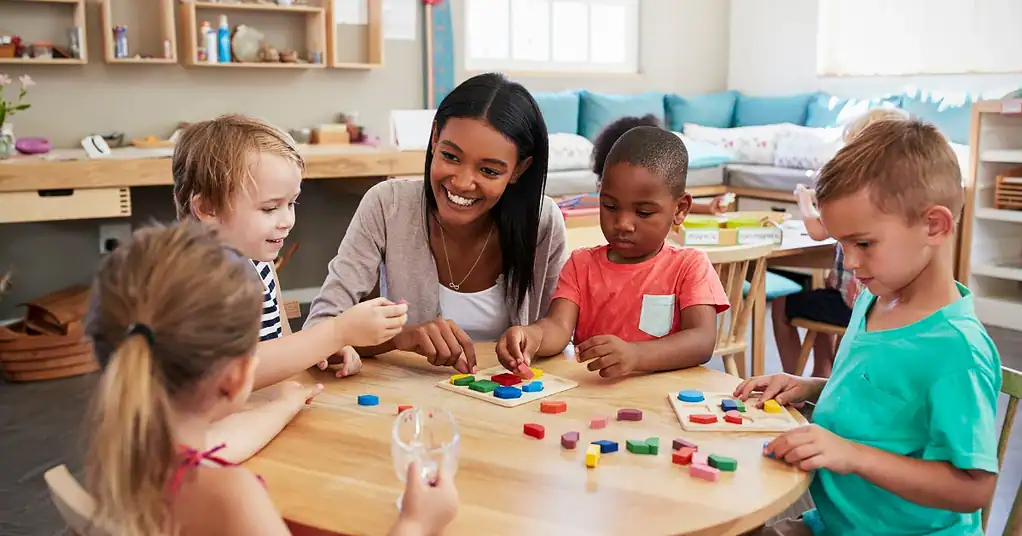Table of Contents
ToggleWhat do we do when a plant isn’t growing well? Do we replace the plant or adjust its environment? It might need more sunlight, water, or fertilizer. We assess its needs and provide what’s necessary for it to flourish.
So, why should it be any different when raising a healthy human being?
Often, we notice problematic behaviors in children and adolescents, and we harshly judge and label them with terms like lazy, bossy, or bully, which they carry throughout their lives. In my decade of experience working with children and adolescents, I have never encountered a “bad child.”
What I have seen are children struggling with developmental challenges, destructive behavior, poor academic performance, and difficulties in relationships and social interactions, all signaling a need for help.
Consider how an Oak tree begins as a tiny acorn before growing into its full potential. Similarly, a child undergoes a significant developmental journey.
Research by The Royal Foundation for Early Childhood, led by Princess Wales, shows that only 36% of adults understand a child’s development process. This lack of understanding among parents, educators, and others involved with children can significantly impact their lifelong development.
A child goes through four stages of cognitive development that affect all aspects of their life into adulthood. As parents, educators, and coaches, it’s crucial to understand these stages to provide the appropriate environment and support for their growth into healthy adults.
In today’s article, I will share insights about Jean Piaget’s four stages of cognitive development.
Cognitive development is a crucial aspect of a child’s growth, influencing how they perceive, think, and understand the world. Jean Piaget, a renowned developmental psychologist, identified four stages of cognitive development that every child goes through. Understanding these stages can help parents, educators, and coaches provide the right support and stimulation at each stage, fostering healthy cognitive development.
During the sensorimotor stage, infants learn about the world through their senses and actions. They begin to understand that their actions can cause things to happen in the world around them. This stage is marked by significant growth in cognitive abilities as infants interact with their environment and begin to understand object permanence, cause-and-effect relationships, and the ability to form mental representations of objects.
Key Milestones
Reflexes (0-1 month):
- Newborns exhibit innate reflexes, such as sucking, grasping, and rooting. These reflexes are the building blocks for more complex behaviors.
Primary Circular Reactions (1-4 months):
- Infants begin to coordinate separate actions into single, integrated activities. For example, they might combine grasping an object with sucking on it.
- Repetition of actions that are pleasurable or interesting, focusing on their own body (e.g., sucking thumb).
Secondary Circular Reactions (4-8 months):
- Infants start to focus on the environment and repeat actions that bring about a response from outside their body. For example, shaking a rattle to make a noise.
- Awareness of the relationship between their actions and external consequences.
Coordination of Secondary Circular Reactions (8-12 months):
- Infants begin to show intentional actions and combine schemes to achieve specific goals. For example, they might use one hand to hold an object and the other to manipulate it.
- Development of object permanence, understanding that objects continue to exist even when they are out of sight.
Tertiary Circular Reactions (12-18 months):
- Infants experiment with new ways of playing with objects and exploring their environment. They engage in trial and error to see what effects different actions have.
- They become more creative and flexible in their actions, discovering new ways to achieve desired results.
Mental Representation (18-24 months):
- Toddlers develop the ability to form mental representations of objects and actions, allowing them to solve problems in their minds without having to physically experiment.
- Deferred imitation becomes possible; they can imitate actions they observed in the past.
- The beginning of symbolic thought sets the stage for language development and more complex cognitive processes.
Supporting Children in This Stage
Supporting children in the sensorimotor stage involves providing them with opportunities to explore their environment safely and interact with a variety of stimuli. Here are some key strategies for supporting children during this stage.
- Encourage Exploration and Sensory Play
- Provide Safe Spaces: Ensure the environment is safe for exploration. Baby-proof the area to remove any potential hazards.
- Varied Textures and Objects: Offer toys and objects with different textures, shapes, and sizes to stimulate sensory exploration.
- Safe Mouth Exploration: Since infants learn a lot by putting objects in their mouths, ensure that toys are non-toxic and free from small parts that could pose a choking hazard.
- Stimulate Senses
- Visual Stimulation: Use brightly colored toys and high-contrast patterns to attract the infant’s attention.
- Auditory Stimulation: Provide toys that make different sounds, such as rattles, musical instruments, and soft books with crinkly pages.
- Tactile Stimulation: Offer a variety of materials, such as soft blankets, textured balls, and plush toys, to enhance tactile experiences.
- Encourage Movement and Physical Activity
- Reaching and Grasping: Place toys within and just out of reach to encourage reaching and grasping.
- Rolling and Crawling: Create safe spaces for infants to practice rolling over and crawling. Soft play mats and obstacle courses made of pillows can be fun and challenging.
- Walking and Standing: Provide sturdy furniture or push toys that infants can use to pull themselves up and practice walking.
- Interactive Play
- Face-to-Face Interaction: Engage in face-to-face play with your child. Make eye contact, smile, and mimic their sounds and expressions.
- Peekaboo: Play peekaboo and other interactive games to help develop object permanence.
- Talking and Singing: Talk to your child throughout the day, describing what you are doing. Sing songs and nursery rhymes to enhance language development and auditory processing.
- Encourage Cause-and-Effect Understanding
- Interactive Toys: Provide toys that respond to actions, such as pressing buttons to make sounds or moving parts that create a reaction.
- Simple Puzzles: Offer age-appropriate puzzles that require fitting shapes into corresponding holes to develop problem-solving skills.
- Stacking and Nesting Toys: Encourage activities like stacking blocks or nesting cups to help understand spatial relationships and cause-and-effect.
- Support Emotional and Social Development
- Responsive Caregiving: Respond promptly and warmly to your child’s needs. This helps build a sense of security and trust.
- Joint Attention: Engage in activities that involve sharing a focus on the same object or activity, such as looking at a book together.
- Social Play: Arrange playdates with other children to promote social interaction and observe how other children play.
- Provide Opportunities for Imitation
- Modeling Behavior: Demonstrate simple actions, like clapping hands or waving, and encourage your child to imitate you.
- Imitation Games: Play games that involve imitation, such as pat-a-cake or copying facial expressions.
- Foster Independence
- Self-Feeding: Allow children to try self-feeding with finger foods, fostering hand-eye coordination and independence.
- Choice Making: Offer simple choices between two toys or activities to encourage decision-making skills.
Preoperational Stage (2-7 years)
In the preoperational stage, children’s thinking is characterized by symbolic representation and intuitive thought. They can form mental images and use language to represent objects and experiences. However, their thinking is still egocentric, meaning they have difficulty seeing things from perspectives other than their own. They also struggle with understanding the concept of conservation, the idea that quantity remains the same despite changes in shape or appearance.
Key Milestones
Symbolic Function (2-4 years):
- Language Development: Rapid expansion of vocabulary and language skills. Children begin to use words and sentences to communicate and describe their experiences.
- Pretend Play: Engaging in imaginative play, where they use objects to represent other things (e.g., a stick becomes a sword). This demonstrates their ability to use symbols.
- Drawing and Art: Beginning to create drawings that represent objects, people, and events, often with imaginative elements.
Egocentrism:
- Egocentric Thinking: Children have difficulty understanding that others have perspectives different from their own. For example, they might assume everyone sees what they see.
- Three Mountains Task: Piaget’s classic experiment to demonstrate egocentrism, where children describe what they see from their viewpoint and assume others see the same.
Intuitive Thought (4-7 years):
- Curiosity and Questions: Children ask numerous questions about the world around them, often using “why” and “how” to explore their environment and concepts.
- Animism: Belief that inanimate objects have feelings and intentions (e.g., believing a stuffed animal is alive).
- Artificialism: Belief that natural phenomena are created by human beings or other agents (e.g., thinking clouds are made by people).
Lack of Conservation:
- Conservation Tasks: Difficulty understanding that quantity remains the same despite changes in shape or appearance. For example, they might think that pouring water from a short, wide glass into a tall, thin glass changes the amount of water.
- Centration: Focus on one aspect of a situation to the exclusion of others. For example, focusing only on the height of the water in the glass and ignoring the width.
Classification and Seriation:
- Classification: Beginning to group objects based on shared characteristics, such as color or shape. However, they often struggle with more complex classification tasks.
- Seriation: The ability to arrange objects in a logical order, such as by size or number, though this ability is still developing and can be inconsistent.
Transductive Reasoning:
- Cause-and-effect Confusion: Making illogical connections between unrelated events. For example, a child might believe that a particular event caused the sun to rise.
Supporting Children in This Stage
- Encourage Symbolic Play and Imagination
- Provide Pretend Play Materials: Offer a variety of props, costumes, and toys that encourage imaginative play, such as dolls, action figures, play kitchens, and building blocks.
- Engage in Role-Playing: Participate in pretend play with children, taking on different roles and scenarios to stimulate their imagination and social skills.
- Creative Arts: Encourage drawing, painting, and crafting to help children express themselves and develop their symbolic thinking.
- Foster Language Development
- Read Together: Read books aloud regularly and discuss the stories. Ask open-ended questions to encourage children to think about and articulate their thoughts.
- Expand Vocabulary: Introduce new words in context and encourage children to use them in conversation.
- Storytelling: Encourage children to create their own stories, which helps develop their narrative skills and imagination.
- Promote Social Interaction
- Playdates and Group Activities: Arrange playdates and group activities where children can interact with peers, practice sharing, and learn social norms.
- Cooperative Play: Encourage games and activities that require teamwork and cooperation, helping children develop empathy and social skills.
- Model Social Behavior: Demonstrate positive social behaviors, such as sharing, taking turns, and expressing emotions appropriately.
- Support Emotional Development
- Recognize and Validate Emotions: Acknowledge children’s feelings and help them label and express their emotions appropriately.
- Teach Coping Skills: Teach simple strategies for managing emotions, such as deep breathing, counting to ten, or talking about their feelings.
- Provide a Safe Environment: Create a secure and predictable environment where children feel safe to explore and express themselves.
- Enhance Cognitive Skills
- Introduce Basic Concepts: Use everyday activities to teach basic concepts such as numbers, colors, shapes, and sizes.
- Problem-Solving Activities: Offer puzzles, matching games, and sorting tasks to develop problem-solving and critical thinking skills.
- Encourage Exploration: Provide opportunities for children to explore their environment, ask questions, and experiment with different materials.
- Develop an Understanding of Conservation and Logical Thinking
- Hands-On Activities: Use practical activities to teach concepts like conservation. For example, pour water between different-shaped containers and discuss the amount.
- Concrete Examples: Provide concrete, hands-on experiences that allow children to manipulate objects and see the results of their actions.
- Discuss Differences and Similarities: Help children compare and contrast objects and situations to develop their understanding of classification and seriation.
- Support Physical Development
- Gross Motor Activities: Encourage physical activities that develop large muscle groups, such as running, jumping, climbing, and playing with balls.
- Fine Motor Activities: Provide materials that promote fine motor skills, such as playdough, beads for stringing, and drawing tools.
- Outdoor Play: Ensure children have plenty of opportunities for outdoor play to develop their physical coordination and overall health.
- Encourage Independence
- Self-Care Skills: Teach and encourage self-care skills such as dressing, feeding, and toileting.
- Decision-Making: Allow children to make simple choices, such as selecting their clothes or choosing a snack, to promote independence and decision-making skills.
- Responsibility: Assign age-appropriate chores or tasks to help children develop a sense of responsibility and accomplishment.
- Address Egocentrism
- Perspective-Taking Activities: Use games and activities that encourage children to consider others’ viewpoints, such as role-playing and discussing different characters’ perspectives in stories.
- Empathy Building: Talk about emotions and situations that others might experience, helping children understand and relate to different feelings.
Concrete Operational Stage (7-11 years)
In the concrete operational stage, children gain a better understanding of mental operations and can think logically about concrete events. They develop the ability to perform various mental operations, such as classification, seriation, and transitivity, and they can understand the concept of conservation. However, their thinking is still limited to concrete objects and events, and they need help with abstract or hypothetical concepts.
Key Milestones
Conservation:
- Understanding Conservation: Children learn that quantity remains the same despite changes in shape or appearance. They can now understand that pouring water from a short, wide glass into a tall, thin glass does not change the amount of water.
- Conservation Tasks: They can solve various conservation tasks involving number, mass, length, and volume.
Decentration:
- Decentering: Children can focus on multiple aspects of a situation at once. For example, they can consider both the height and width of a glass when determining the amount of liquid it contains.
Reversibility:
- Reversible Thinking: Children understand that objects and numbers can be changed and then returned to their original condition. For example, they understand that if you flatten a ball of clay, it can be reshaped into a ball again.
Classification:
- Grouping Objects: Children can group objects based on common characteristics and understand the hierarchy of categories and subcategories. For example, they can classify animals like mammals, reptiles, and birds.
- Class Inclusion: They understand that a subclass (e.g., roses) can be part of a larger class (e.g., flowers) and that there are other subclasses (e.g., tulips) within the same larger class.
Seriation:
- Ordering Objects: Children can arrange objects in a logical order based on a particular characteristic, such as size, weight, or length. For example, they can organize sticks from shortest to longest.
Transitivity:
- Transitive Inference: Children can understand the relationship between two objects by knowing the relationship to a third object. For example, if they know that A is greater than B and B is greater than C, they can infer that A is greater than C.
Concrete Logic:
- Logical Thinking: Children can think logically about concrete objects and events. They can logically solve problems but struggle with abstract or hypothetical concepts.
- Mathematical Operations: They begin to understand and perform mathematical operations such as addition, subtraction, multiplication, and division.
Reduction in Egocentrism:
- Perspective-Taking: Children become less egocentric and can understand that others have different perspectives and feelings. They are better able to see things from another person’s point of view.
Supporting Children in This Stage
- Encourage Hands-On Learning
- Use Concrete Materials: Provide materials such as blocks, measuring cups, and other manipulatives that children can use to explore mathematical and scientific concepts.
- Experiments and Projects: Engage children in experiments and projects that allow them to observe, manipulate, and draw conclusions about concrete objects and events.
- Field Trips: Take children on field trips to museums, science centers, and nature parks to provide real-world experiences that reinforce classroom learning.
- Promote Logical Thinking
- Problem-Solving Activities: Provide puzzles, brainteasers, and logic games that challenge children to think critically and solve problems.
- Step-by-Step Instructions: Encourage children to follow and give step-by-step instructions for various tasks, helping them develop sequential thinking skills.
- Classification and Sorting: Offer activities that involve sorting and classifying objects based on different criteria, such as color, size, and shape.
- Support Mathematical Understanding
- Math Games: Use games that involve counting, addition, subtraction, multiplication, and division to make learning math fun and engaging.
- Real-Life Math: Integrate math into everyday activities, such as cooking (measuring ingredients), shopping (making changes), and planning trips (calculating distances and time).
- Visual Aids: Use visual aids like charts, graphs, and number lines to help children understand mathematical concepts.
- Enhance Language and Reading Skills
- Reading Together: Continue reading together, choosing books that challenge their reading level and stimulate their imagination.
- Discussion and Analysis: Encourage discussions about the stories, focusing on characters, plot, and themes to develop comprehension and analytical skills.
- Writing Projects: Encourage children to write stories, reports, and journals to enhance their writing and creative thinking skills.
- Foster Social and Emotional Development
- Group Activities: Encourage participation in group activities, such as team sports, clubs, and cooperative learning projects, to build teamwork and social skills.
- Conflict Resolution: Teach and model conflict resolution skills, helping children learn to negotiate, compromise, and empathize with others.
- Emotional Awareness: Help children recognize and express their emotions appropriately, and teach them strategies for managing stress and frustration.
- Develop an Understanding of Conservation and Logical Operations
- Conservation Tasks: Provide activities that involve comparing quantities, such as measuring liquids and solids, to reinforce the concept of conservation.
- Logical Operations: Encourage activities that involve ordering, seriation, and transitive reasoning, such as arranging objects by size or weight and understanding relationships between different sets.
- Encourage Responsibility and Independence
- Chores and Responsibilities: Assign age-appropriate chores and responsibilities to help children develop a sense of responsibility and independence.
- Decision-Making Opportunities: Allow children to make choices about their activities, schedules, and projects, fostering decision-making skills.
- Goal Setting: Help children set and achieve personal goals, teaching them to plan, prioritize, and stay organized.
- Support Physical Development
- Active Play: Ensure children have plenty of opportunities for physical activity, such as playing sports, biking, and outdoor play, to develop their gross motor skills.
- Fine Motor Activities: Provide activities that enhance fine motor skills, such as drawing, writing, crafting, and using tools.
- Encourage Scientific Exploration
- Science Kits: Provide science kits and tools that allow children to conduct experiments and explore scientific concepts.
- Nature Exploration: Encourage exploration of the natural world through activities like hiking, gardening, and observing wildlife.
- Inquiry-Based Learning: Foster curiosity and inquiry by encouraging children to ask questions, make predictions, and test their ideas.
- Support Cognitive Challenges
- Memory Games: Engage children in games that enhance memory and concentration, such as matching games and memory cards.
- Strategic Games: Introduce board games and strategy games that require planning, logical thinking, and foresight.
Formal Operational Stage (12 years and up)
In the formal operational stage, adolescents and adults can engage in abstract thinking and use logical operations in more complex ways. This stage is marked by the ability to think about abstract concepts, engage in systematic problem-solving, and understand hypothetical situations. Individuals can also consider multiple perspectives and use scientific reasoning.
Key Milestones
Abstract Thinking:
- Abstract Concepts: Ability to think about abstract ideas and concepts that are not directly tied to concrete experiences. Examples include freedom, justice, and love.
- Hypothetical Reasoning: Ability to consider “what if” scenarios and think about possibilities beyond the here and now.
Logical and Systematic Thinking:
- Hypothetico-Deductive Reasoning: Ability to formulate hypotheses and systematically test them to conclude. This involves creating a plan, predicting outcomes, and evaluating results.
- Scientific Reasoning: Understanding and applying the scientific method, including forming hypotheses, conducting experiments, and analyzing data.
Problem-Solving Skills:
- Systematic Problem Solving: Ability to approach problems methodically, considering all possible solutions and using logical steps to arrive at the best outcome.
- Multivariable Thinking: Understanding that problems can have multiple variables and being able to manipulate and consider these variables simultaneously.
Understanding of Complex Relationships:
- Proportional Thinking: Ability to understand and work with proportions, ratios, and probabilities.
- Analogical Reasoning: Using analogies to understand complex concepts and solve problems by relating new information to known concepts.
Metacognition:
- Thinking About Thinking: Ability to reflect on one’s thought processes, understand how one learns, and use this understanding to improve problem-solving and learning strategies.
Perspective-Taking and Moral Reasoning:
- Perspective-Taking: Ability to understand and consider multiple viewpoints and perspectives.
- Advanced Moral Reasoning: Development of more sophisticated moral reasoning, moving beyond concrete rules to consider broader ethical principles and the welfare of others.
Supporting Adolescents in This Stage
- Encourage Abstract Thinking
- Engage in Discussions: Have conversations about abstract concepts such as justice, freedom, and morality. Encourage adolescents to express their opinions and reason through their arguments.
- Explore Hypothetical Scenarios: Present hypothetical situations and ask adolescents to consider different outcomes and implications.
- Promote Logical and Systematic Thinking
- Problem-Solving Activities: Provide complex problems that require systematic approaches to solve. Encourage the use of logic and evidence to support conclusions.
- Scientific Exploration: Encourage participation in science projects, experiments, and research activities that require forming hypotheses, conducting experiments, and analyzing results.
- Support Advanced Problem-Solving Skills
- Critical Thinking Exercises: Engage in activities that require critical thinking, such as debates, logic puzzles, and strategy games.
- Project-Based Learning: Involve adolescents in long-term projects that require planning, research, and execution, fostering project management and problem-solving skills.
- Enhance Understanding of Complex Relationships
- Mathematical and Logical Challenges: Provide opportunities to work with advanced mathematical concepts, such as algebra, geometry, and probability.
- Use of Analogies: Encourage the use of analogies to explain complex ideas and relate new concepts to familiar ones.
- Develop Metacognitive Skills
- Reflective Thinking: Encourage adolescents to reflect on their thinking processes and strategies. Discuss what approaches worked, what didn’t, and why.
- Study Skills: Teach effective study techniques and self-monitoring strategies to help adolescents take control of their learning.
- Foster Perspective-Taking and Moral Reasoning
- Role-Playing Activities: Engage in role-playing activities that require considering different viewpoints and empathy.
- Ethical Discussions: Discuss ethical dilemmas and encourage adolescents to consider the implications of different actions and the perspectives of others.
- Support Social and Emotional Development
- Peer Interaction: Encourage healthy peer relationships and provide opportunities for group work and social activities.
- Emotional Support: Be available to discuss emotions and challenges. Offer support and guidance as adolescents navigate complex social and emotional landscapes.
- Encourage Independence and Responsibility
- Decision-Making Opportunities: Allow adolescents to make important decisions and take responsibility for their actions. Encourage them to think about the consequences of their choices.
- Goal Setting: Help adolescents set and work towards personal, academic, and career goals. Encourage them to create action plans and reflect on their progress.
- Provide Real-World Experiences
- Internships and Volunteering: Encourage participation in internships, volunteer work, and other real-world experiences that provide practical applications of abstract and logical thinking.
- Community Involvement: Involve adolescents in community projects and social issues to develop a sense of responsibility and civic engagement.
Conclusion
In conclusion, understanding and supporting each stage of a child’s cognitive development is crucial for their overall growth and success. Jean Piaget’s theory provides a comprehensive framework for recognizing the unique needs and abilities of children as they progress from the sensorimotor stage through to the formal operational stage. By providing a nurturing, stimulating, and supportive environment tailored to each developmental phase, parents, educators, coaches, and caregivers can help children reach their full potential.
Just as a gardener adjusts the environment to meet the needs of a growing plant, we must assess and address the needs of our children to foster their cognitive and emotional development.
Recognizing that problematic behaviors often stem from unmet developmental needs, rather than inherent flaws, allows us to approach child-rearing with compassion and understanding. By focusing on the individual journey of each child, we can ensure they grow into healthy, well-adjusted adults equipped with the skills and knowledge to navigate the complexities of life.












